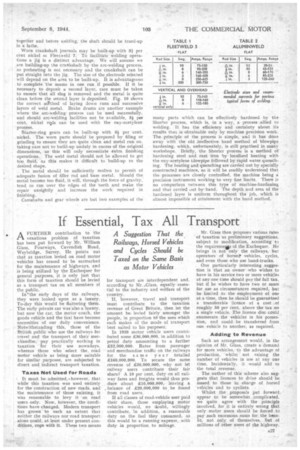If Essential, Tax All Transport
Page 29

If you've noticed an error in this article please click here to report it so we can fix it.
A Suggestion That the . Railways, Horsed Vehicles and Cycles Should be Taxed on the Same Basis as Motor Vehicles
AFURTHER contribution to the vexatious problem of taxation has been put forward by Mr. William Glass, Fourways, Cavendish Road, Weybridge, Surrey. Be points out that as taxation levied on road motor vehicles has ceased to be earmarked for the maintenance of highways, and is being utilized by the Exchequer for general purposes, it is only just that this form of taxation should be levied as a transport tax on all members of the public.
In'the early days of the railways, they were looked upon as a luxury. To-day this would be flattering them. The early private car was 'also a luxury, but now the car, the motor coach, the goods vehicle and the taxi have become necessities of our daily convenience. Notwithstanding this, those of the British public who use the railways for travel and the transport of their merchandise, pay practically nothing in taxation for their nee nowadays, whereas those who select the. road motor vehicle as being more suitable for similar purposes, are subjected to direct and indirect transport taxation.
Taxes Not Used for Roads
It must be admitted,' however, that while this taxation was used entirely for the construction of new roads, and the maintenance of those existing, it was reasonable to levy it on road users only. Now, however, the conditions have. changed. Modern transport has grown to such an extent that neither the railways nor-road transport alone could, at least under present conditions, cope with it. These two means
for transport are interdependent and, according to Mr. Glass. equally essential to the industry and welfare of the • country.
If, however, travel and transport must contribute to the taxation revenue of Great Britain, then let the amount he. levied fairly amongst the people, in proportion tdthe uses which each makes of the mode of transport best suited to his purpoaes.
In 1938 motor vehicle users contributed some R86,000,000, in addition to petrol duty amounting to a further £52,000,000. Rates from passenger and merchandise traffic on the railways for the same year totalled £160,000,000. To secure the same revenue of £36,000,000, why not let railway users contribute their fair share? A 10 per cent, duty on all railway fares and freights would thus produce about £16,000,000, leaving a , balance of £20,000,000 to be found from road users.
If all classes of road-vehicle user paid their share, those employing motor vehicles would, no doubt, willingly contribute, 'in addition, a reasonable duty on the fuel they coastline& as this would be a running expense, with duty in proportion to mileage. Mr. Glass then proposes various rates of taxation as preliminary suggestions, subject to modification, according to the requiremelos of the Exchequer. He brings in not only the railways, but operators of horsed vehicles, cycles, and even those who use hand-trucks. . One particularly interesting suggestion is that an owner who wishes to have in his service two or more vehicles at any one time should pay the full tax. but if he wishes to have two or more for use as circumstances required, but be limited to the employment of one at a time, then he should be guaranteed a transferable licence at a cost of roughly 50 per cent. above the tax on a single vehicle. The licence disc could enumerate the vehicles in his possession, and could be transferred from one vehicle to another, as required.
Adding to Revenue Such an arrangement would, in the opinion of Mr. Glass, create a demand for more vehicles,. to the advantage of production, whilst not raising the number of vehicles in use at any one time. Incidentally, it would add to the total revenue.
The author of this scheme also suggests that licences to drive should be issued to those in charge of horsed vehicles and to cyclists.
Whilst the proposals put forward appear to be somewhat complicated, we quite agree with the principle involved, for it is entirely wrong that only motor users should be forced to pay each enormous sums for the benefit, not only. of themselves, 6nt of millions of other users of the highway.




















































